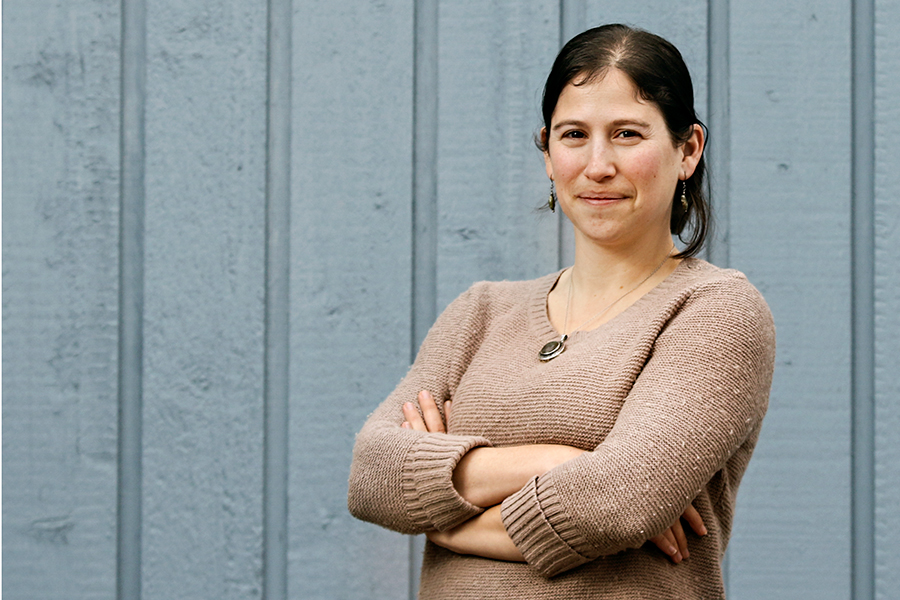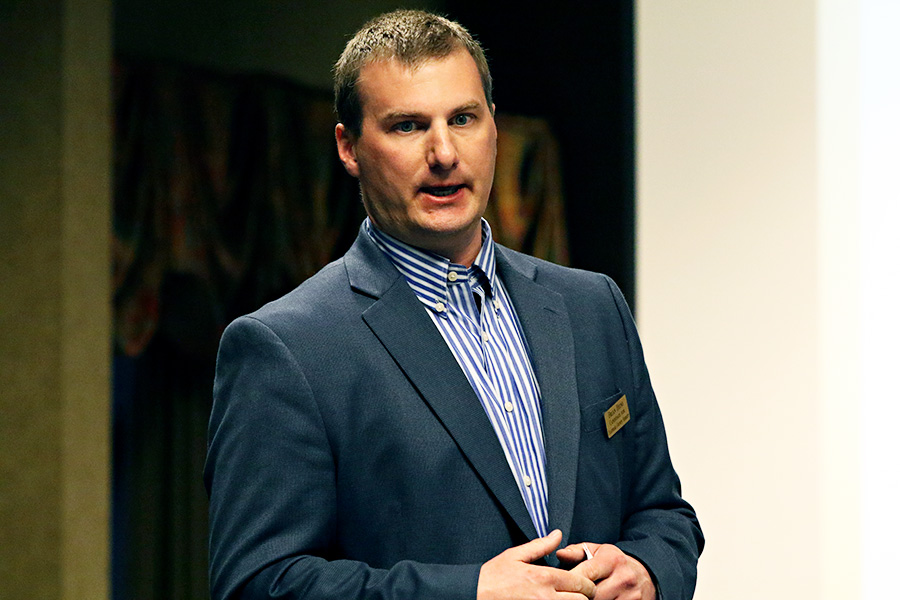‘The System Failed’
One month after she reported a vicious attack and less than three weeks after she was granted a restraining order, Emily Mohler, her 3-year-old daughter Piper, and Cody Nevins were stabbed to death by Mohler’s estranged husband. Her family wants to know why a violent man with a documented history of abuse wasn’t stopped before it was too late.
By Andy Viano
On Memorial Day, Emily Mohler called 911. She told the dispatcher that her husband, Kameron Barge, had assaulted her in front of the couple’s two young children, slinging her to the ground, pulling her sweatshirt tightly around her neck and screaming that he was going to kill her.
When a Flathead County sheriff’s deputy arrived later that day, Mohler provided the same account. The couple was in the process of finalizing their divorce, and Mohler had moved into her own home, away from a partner who had abused her for years, according to court filings. Deputies were unable to reach Barge by phone, and he was living out of his camper in an unknown location. Mohler told deputies she felt safe for the night. So the officers left and wrote up a report.
Three days later, on May 28, that report was sent from the sheriff’s department to the office of the Flathead County Attorney via the county’s electronic reporting system. The sheriff’s office expected a warrant to be returned for Barge’s arrest.
The warrant, which would have been requested from a judge by the county attorney’s office, never came. Flathead County District Attorney Travis Ahner said his office “didn’t get any sort of report that came into our queue.”
“Why it wasn’t reviewed, I don’t know,” Flathead County Sheriff Brian Heino said. “Have I reached out and have we discussed why did this happen? Absolutely.”
“In defense of (Ahner), we’re talking about three, four thousand cases that are going to be processed … From our side, you write the report, you document it, you assign it.”
On June 11, Barge and Mohler appeared in Flathead County District Court in front of Judge Dan Wilson. The purpose that day was to execute the restraining order that Mohler had requested based on the May 25 incident. Wilson granted a permanent order of protection, barring Barge from contact with Mohler or their kids for the next four months.
In her petition for that order, Mohler was explicit in describing abuse she had suffered dating as far back as 2012. She said Barge killed a kitten by slamming it against a wall, he threw baited mousetraps at their young kids, he fractured her skull in two places and he attempted to rape her. He was threatening and violent and erratic.
If a warrant had been issued for Barge’s arrest after the May 25 attack, it could have come to Judge Wilson’s attention in the courtroom that day. And Wilson, who declined to comment for this story, likely would have sent Barge downstairs to the sheriff’s office to be arrested. Instead, Mohler and Barge were sent home and expected back in the courtroom on June 30 to finalize their divorce.
They never arrived.
Early that morning, Barge drove to Mohler’s house in Olney and parked in a place where he would not be seen. He got out of his vehicle, walked to the door and went inside. When he left, Mohler, her daughter, 3-year-old Piper Barge, and 41-year-old Cody Nevins were all dead, stabbed to death in such a violent way that veteran law enforcement officers remain shaken by the scene. Down the road a short while later, Barge parked his vehicle, took out a gun and ended his own life.
An hour or so south, two sheriff’s deputies and a chaplain knocked on Jan and Tom Mohler’s front door. Jan was called away from a meeting to come home, and when they told her the news about her only daughter, she had only one thought.
“They didn’t tell me or maybe they didn’t have a name yet but I knew. I said Kameron did that,” Jan Mohler said. “He had made all these threats and had attempted to choke her, so why wasn’t there more? Why was there so little protection for them in the end?”
“Because the laws aren’t strong enough the system failed my daughter, and Cody, and that little girl, and even Kameron. The system just failed.”

The case of Emily Mohler and Kameron Barge illustrates a number of shortcomings in the legal system’s response to domestic abuse cases, which are among the most common and most challenging that authorities interact with. The National Domestic Violence Hotline cites research that one in four women have been the victim of “severe physical violence” at the hands of an intimate partner in their lifetime, and that intimate partner violence affects more than 12 million people, men and women, every year.
The Abbie Shelter, the Flathead Valley’s domestic violence resource, serves around 1,000 people annually and receives at least that many calls every year to its 24-hour crisis line at (406) 752-7273. Pinpointing how many 911 calls made each year are directly related to partner abuse is difficult to track as they often lump together with, or are difficult to discern from, general disturbances or other assaults, but the Kalispell Police Department, for example, officially conducted 112 partner-family member assault (PFMA) allegations in 2019 alone. And those numbers are likely a fraction of the amount of domestic violence that is actually occurring. For a multitude of reasons, including social stigma, financial reliance, religion or the presence of children, many women who experience domestic violence never report it.
“It’s really common for victims not to call law enforcement because they know it will only make things more dangerous,” Hilary Shaw, the Abbie Shelter’s executive director, said. “They know that their partner will only retaliate against them for tattling. And they also know that once law enforcement leaves it won’t make any difference.”
Seven years after her abuse began, Mohler filed for a restraining order against her husband for the first time. In a Petition for Temporary Order of Protection filed in Flathead County District Court on Aug. 2, 2019, Mohler outlined a litany of past abuses, including the killing of the family’s kitten, attempted rapes and regular physical assaults.
When she signed that document, at least two people in the criminal justice system knew about it. One was the judge overseeing the petition, Dan Wilson. The other was Flathead County Crime Victims Advocate Janiece Hamilton, a one-person department serving a sprawling county, who counsels victims of any crime but ends up focusing on domestic violence because of its pervasiveness.
Hamilton has an almost boundless job that was frequently described as overwhelming by her colleagues in the county attorney’s office, her associates in law enforcement and the local advocates who work with her. She assists with everything from how to file proper paperwork to how to safely separate from an abuser to attending court hearings as a supporter of the petitioner. Hamilton is both proactive and reactive in her position, receiving contact from petitioners who are referred to her by either law enforcement or the clerk of court, and flipping through the steady stream of new complaints and petitions to contact survivors of domestic abuse directly.
Mohler reached out to Hamilton just before her August 2019 filing and the conversation mostly ended there. Hamilton said Mohler had no problem filing the paperwork — and, indeed, the petition was granted — although a few months later Mohler would ask for the restraining order to be lifted, which it was. Attempts at reconciliation are common in domestic violence cases, advocates say, especially in situations where children are involved.
Memorial Day 2020 came less than 10 months after the first restraining order, and by the time May 28 rolled around, a police report, filed in expectation of an arrest warrant, was added to the list of documented evidence that Emily Mohler was being abused and that her abuser was growing more violent.
Yet, the case slipped through the cracks.

Frank Garner retired as Kalispell’s chief of police in 2006, and around that time his department implemented a grant-funded program to specifically attack the problem of domestic abuse. The Domestic Violence Response Team was a multi-disciplinary group, bringing together law enforcement, the prosecutor’s office and victim advocates to coordinate an appropriate reaction to cases of partner abuse.
Garner, who has served as a state legislator since 2015 and is the Republican nominee to return to the House of Representatives next year, remains a strong advocate of those types of law enforcement approaches, even though the grant funding for the Kalispell program expired years ago.
“Well, first it’s a system,” Garner said. “The first responder is not judge and jury. He’s not the prosecutor. And he’s not able to help with the ongoing advocacy for the victim. He or she is going to handle 20 more calls that day.”
“In everything, we know a team approach improves our ability to respond well. It’s no truer than in cases like this, and each person has a responsibility in the system. The advocate does, the first responder does and the prosecutor does.”
There were, at least somewhat formally, similar systems in place at the county level, spearheaded by Hamilton and Flathead County Sheriff’s Deputy Paula Sullivan, in consultation with Shaw from the Abbie Shelter. The group also included a pair of county attorneys who work in justice court, where most orders of protection and PFMA charges are filed. That group met monthly to compare notes and try to at least raise awareness among each other about particularly notable cases.
As much as anything, the group opened lines of communication between the departments. And communication, or a lack thereof, is an overriding issue when disentangling Mohler’s case.
The group that discussed cases in Flathead County started to splinter apart when some prosecutors changed positions after the election of Ahner as county attorney in 2018, and after Sullivan was reassigned as a school resource officer. Then the coronavirus struck, and in-person meetings were discouraged and resources were spread even thinner.
In different circumstances, Emily Mohler’s reported abuse on May 25 would have been flagged, at least by the sheriff’s office and likely by the county advocate. It would have been addressed when they met with prosecutors and the question, presumably, of why no warrant had been issued for Barge’s arrest would have been raised.
Both Ahner and Flathead County Sheriff Brian Heino said the multi-disciplinary team is valuable and effective. But both also said that resources in both offices are stretched thin, and that mandating deputies or attorneys to spend a specific amount of time in such a setting will take resources away from some other aspect of their jobs. Garner agrees, and understands the struggle to adequately allocate resources, but he says it’s hard to look at a case like one where three people, including a child, are brutally killed and not see the need for greater attention.
“There’s no one that thinks we should have less resources (for domestic violence), so the answer is yes, we should find the resources — city, county, state — to help improve, and it’s not just a pot of money. It can be driven by training and priorities,” Garner said.
Garner promoted a change as simple as crafting a memorandum of understanding between local agencies to collaborate on domestic violence cases, but he also recommended another change that has wide, but not unanimous, support.
“Personally, I think embedding the county advocate in with first responders makes sense,” he said. “There’s a lot of reasons why I think having them work every day, on the same cases, with access to the same information (is valuable).”
Hamilton’s position used to be under the supervision of the sheriff’s department and she worked out of that office, in the same building as the county courthouse. Now part of the county attorney’s office, Hamilton says she is separated both physically — the actual county attorney’s office is one building over at 820 S. Main Street — and in terms of her ability to quickly interact with victims, what’s described by advocates as early intervention and is one of the best-known tools to intervene in an abusive relationship. Hamilton arrives each morning to a stack of domestic violence calls at her desk and reaches out to most or all of them. Unfortunately, by that time, many of those victims have walked back their stories or don’t want to talk.
“I wish I could catch them a little bit earlier, like the same night,” Hamilton said. “I’ll call (victims) and they are usually interested in trying to protect themselves at that point but when they come back home, it gets scary for them, and of course (the abuser) is saying ‘don’t do this, don’t do this.’”
“If they can’t come in right away, I lose them. I understand that, and I’ve had people call me the next time something happens.”

Current Kalispell Chief of Police Doug Overman has an advocate working out of his department in Amy Meyer, who is paid by the Abbie Shelter. He explained how difficult it can be for survivors to break away from their abuser, or even contact the victim advocate in the first place.
“Think about how difficult it is, making that phone call when you have all these moving parts,” he said. “You’re a mom and you’re relying on this person for financial security, and you’ve been with this person for 10 years, and you love them. There’s just always moving parts.”
Hamilton and Heino both believe the county’s advocate position would better serve survivors of domestic abuse in the sheriff’s office. Heino even had a desk picked out for Hamilton, but when a transfer was requested, it was denied by the county attorney’s office. Hamilton still believes a transfer would benefit both her and victims.
Ahner agreed that early intervention is valuable, but said he prefers Hamilton remain in his office so that she can assist as the investigation into each case progresses, not just in the hours after the abuse occurs.
“It’s helpful to have an advocate in right away and as early as possible, and fortunately we’re able to do that with how (Hamilton) gets those reports,” Ahner said. “But then again, it’s the long haul, that long process, and that’s where the resources from the victims advocate become helpful and where it’s our office (involved).”
That explanation, however, belies a reality in which very few cases of domestic abuse are actually prosecuted and even fewer result in convictions. Everyone agrees PFMA cases are among the most challenging to bring, because they often involve reluctant victims — for myriad reasons, including fear and shame — and few, if any, witnesses.
In Flathead County, there were just 142 PFMA charges in 2019, with only 20 guilty verdicts. The same year, 521 petitions for orders of protection were filed and, advocates say, that number represents only a small percentage of actual abuse. The numbers are similar in both 2018 and so far in 2020.
Heino, the Flathead County sheriff, would like to see Ahner take a more aggressive approach to filing cases. He was unable to provide data on how many domestic abuse-related calls his office responds to by the time the Beacon went to print, but the percentage of cases his office sends to the county attorney and how many are prosecuted is a source of frustration.
“It’s not just PFMA, it’s a totality thing,” Heino said. “We have to hold people accountable for crimes, and I’m in law enforcement so I’m probably going to say that, but I think a lot of times we are very lenient on what we hold people accountable for.”
“I get the struggles they have, I do. Courts are a lot harder … but from our standpoint, our job is to protect the community. It’s hard to do that when our job is to arrest them, bring them in front of a court, and then they’re just constantly in and out the doors.”
Ahner did not immediately respond when asked to reply to Heino’s remarks but said earlier the two “routinely check in on” their relationship and what is needed for certain cases to move forward with a prosecution. He also addressed the specific difficulties in prosecuting domestic violence cases.
“As a general rule, they’re hard,” Ahner said. “Part of that is due to the emotional elements that are involved with it, part of it is due to a jury being tasked with this person said it happened this way, that person said it happened the other way, and how do we sort out which one’s telling the truth.”
Heino pointed not just to failures to prosecute but to low bail amounts that allow suspects to be released within hours of an arrest, as well as weak sentences that he believes do little to protect abuse survivors. And across the board changes have been suggested. Heino would love a dedicated deputy to work domestic violence cases, everyone in law enforcement and advocacy wants more money devoted to mental health services, and Heino and Ahner are in favor of more resources and staff being devoted to the victims advocate office.
Mohler’s family wants lawmakers to look into the feasibility of using GPS tracking devices to monitor those involved in orders of protection, and Garner and fellow legislators are looking into that possibility. And both Garner and Ahner would be open to addressing some of the legal statutes to allow for stronger penalties for certain types of abusers.
But what advocates like Hilary Shaw of the Abbie Shelter believe would save the most lives is a lot harder to reach, and it has nothing, specifically, to do with the criminal justice system. Social shifts around domestic violence have been made, but progress happens slowly, and while the days of cops driving abusers to a neighbor’s house for the night — as Garner says may have happened 35 years ago when his law enforcement career began — are a thing of the past, in too many situations abuse is still looked upon as something that should remain in the home, between two people who need to work it out alone. And too often the public perception of abuse is that if it were really so bad, the victims would leave, a brutal minimization of the deep psychological scars and practical challenges that survivors face, part of a cycle of violence that advocates describe.
In short, the thing that would save the most lives is a new world, Shaw says. One she and her colleagues at have been fighting for and will continue to fight for, even if they know it’s an uphill climb that seemingly has no end.
“Working in domestic violence is like staring at a mountain that you know you’re never going to get to the top,” Shaw said. “And you just keep climbing anyways. I can keep talking about these things and maybe by the end of my career there will be some markable changes, some notable changes that I can see that I know we brought about by our efforts.”
“Violence against women is a normative behavior and it takes a lot to change norms.”
If you or someone you know is the victim of domestic violence, the Abbie Shelter operates a 24-hour crisis helpline at (406) 752-7273. Additional information can be found at www.abbieshelter.org.